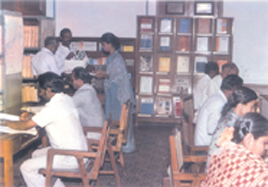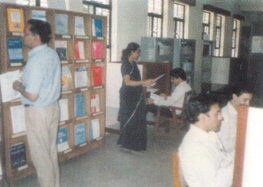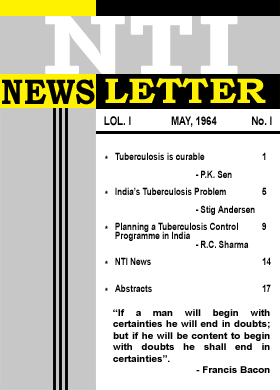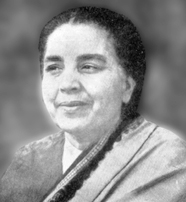3. IN THE WAKE OF KNOWLEDGE
3.11. Accomplishments in knowledge dissemination
The steadily growing knowledge in TB control brought with it a type of pressure that urged the NTI to find newer paths to tread than lecturing, teaching, training, conducting seminars and writing papers because every path had its own objective oriented limitations. The NTI had ambitious plans to reach out. One thing it did on priority was the expansion of library facilities. By 1970, its annual budget was doubled to one lakh rupees and its floor area more than doubled. In addition to the regular services, the library started the following activities: current awareness service, indexing service, selective dissemination of information, compilation of mailing addresses, user education programmes and systematising information to different levels for e.g., programme supervisors, state TB demonstration and training centres, health institutions, academic institutions, functioning health centres, allied teaching and research institutions. The library and dissemination services rapidly became a cynosure for all the trainees, visitors and distinguished TB workers. In fact, its services contributed to the growth of the NTI by taking cues from contemporary events elsewhere and helpful to inform others.
|
|
|
A disease like TB cannot be tackled by a few, however dedicated. The methodology discovered by NTI had to be widely disseminated. Hence an idea of starting a new medium to inform others began to germinate in 1963. Dr Nagpaul lost no time and brought out the maiden issue of the NTI Newsletter in May 1964. In the editorial he wrote the following memorable lines:
"Placing the first issue of the NTI Newsletter in your hands has given a sense of achievement. Hereafter our energies will be directed towards making the Newsletter a worthy instrument of communication between the Institute and the growing circle of our well wishers and alumni. Through the Newsletter, the Institute becomes an open letter to you to comment upon, suggest, inform or criticise."
|
|
The newly founded Newsletter was designed for administrators, research workers, policy makers, NGOs besides programme workers. Its users would be both medical and para medical personnel. It would not become too technical and highbrow. It would be a quarterly. Besides publishing what NTI wanted to report about programme information, it would contain popular articles, abstracts, select bibliographies, news about the NTI, readers forum, question and answers. It would also contain messages. A sample:*
|
*Dr Cheera Chamnanvanakit I am grateful to receive the NTI Newsletter as an alumnus and am especially happy to read the editorials. Having gone through the article, “Results of chemotherapy under programme conditions”, I now feel that implementation of the TB programme needs to attend to many factors in order to reach the expected efficacy of chemotherapeutic drugs. How can this be done, when perhaps the greatest barrier is fear on the part of the medical professionalists themselves? They are afraid of TB patients, of examining sputa etc., on account of infection. How can our programme go forward? I am the editor of our Regional TB Newsletter. My main purpose is to sell new ideas, change old concepts and motivate the workers in the TB field for greater efforts. I feel that to influence the behavioural pattern of our doctors, including professors in medical colleges, one must decide conclusively on the endogenous exacerbation or exogenous superinfection controversy, to allay their fears of infection. |
|
|
Set against odds, it broke new ground and traversed different
paths. Therefore, its reputation spread far and wide. Especially, TB workers
of long standing repute came from all over the world. A sample –
Dr MD Deshmukh, Dr PK Sen, Dr BK Sikand, Dr J Frimodt Moller, Dr K Toman,
Dr J Guld, Ms Leela Dushkin, Dr Gallagher, Dr SP Gupta, Mr A Billington,
Dr Caroll E Palmer, Dr Shirlee H Ferebee, Dr Susheela Nayar, Dr KN Rao,
Dr GM Berg, Dr Egger, Mr Garden Carter, Dr JB Srivastava, Dr SP Tripathy,
Dr Stefan Grzybowski, Dr Karel Styblo, Dr F Polansky, Dr Johns Holm, Dr
KL Hitze, Dr Olakowski, Dr Wallace Fox.



